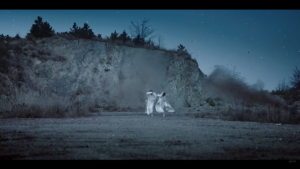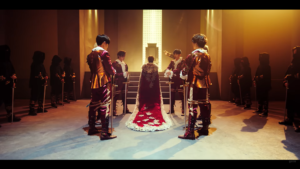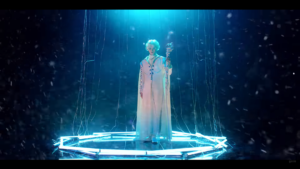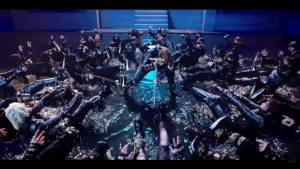
Not to be confused with the upcoming competition show, GF Entertainment’s Kingdom have released a debut album with world building and visuals the likes of something from The Lord of the Rings (obviously not on the same scale, do not come for me please). Each member is meant to embody or emulate a different king or ruler from history, some of which are centuries old. It seems fans are along for quite a lore-filled ride with each subsequent installment, the first of which focuses on King Arthur.
History of Kingdom: Part I. Arthur is built around the sound and theme that you would expect of an album about Arthur Pendragon. The legendary British king who sat at the head of the knightly fellowship, the Round Table, is steeped in mystery, majesty, and urban legend. While it is not clear if Arthur Pendragon truly was a real person, his name and illustrious drama with Guinevere and Lancelot live on to this day.

Most notable of these dramatic retellings of Arthur’s supposed life are in the 13th century song cycles Vulgate and Post-Vulgate and Sir Thomas Mallory’s Le Morte d’Arthur (The Death of Arthur). To this day, archaeologists and historians continue to theorize about the true origins of this regal magnate, even attempting to “find” Camelot in modern-day Wales and England.
Inspired by the Arthurian legend of Britain and numerous modern interpretations, the oftentimes evoked image of Arthur is that of a majestic warrior with luxurious robes, finely smithed swords, and a cult-like following of knights and subjects. He is believed to have lived in Camelot, a mythical castled city and to have fought valiantly in battle and led the quest for the Holy Grail used by Jesus Christ. Although the MV features each member as their respective rulers, the core of the story is Arthur and his knights, long red robe, famous sword Excalibur, and all.
The title track “Excalibur” is a fusion of hard-hitting pop rock and ironically, vocal chorales as intros and outros to the song. The majority of the sound represents Arthur’s valiant persona and boisterous chivalry, but the chorales suggest a more subtle historical reference — Renaissance polyphony. Polyphony, or multi-voice music, is often characterized by equal importance of multiple voices or instruments simultaneously. In the Renaissance these would have been performed in both concert venues as well as cathedrals and other sacred spaces.

Obviously here there is no sacred text to accompany the vocal lines, but the shifting harmonies created from the texture of voices without explicit harmonies suggests that the artists are evoking a style of music that likely would have (theoretically) existed in Arthur’s time. Without getting any more into the music theory weeds, this touch of Renaissance sound adds a unique dimension to the thematic concept of the song.
Other imagery in the MV suggests a variety of landscapes, figures, and events to come.
The leader Dann is likely Danish Viking leader Halfdan Ragnarsson. Mujin could be either Park Mubong from God of High School or the ruler of Mujin-ju (present day Gwangju). Louis is almost definitely one of the many King Louis of France. Ivan is probably Ivan the Terrible of Russia (which would be quite a ride thematically). Jahan is perhaps Shah Jahan, the Mughal emperor of India who built the Taj Mahal, and Chiwoo seems to be an ancient tribal leader from what is now China. There are small details, such as the curved blade Jahan has or the katana Mujin momentarily wields, that suggest more regions and story to come, but for now viewers are only given occasional hints.

The song is enjoyable, albeit a bit autotuned and overdramatic, but personally, I can’t help but be concerned about the danger of appropriation or stereotyping with this concept.
The opportunity for world building and thematic development through each comeback is promising, but the drastic mix of cultures and imagery could easily become offensive. GF Entertainment played it safe by debuting with a generally mythological ruler rather than a truly historical one, but time will tell how each member’s persona and imagery manifests going forward. I’m willing to give them the benefit of the doubt, for now at least.
The rest of the songs on the album are nice to listen to, but do not seem to add much in terms of thematic development or any furthering of a story. Rather, they provide a sampling of what the members are capable of vocally and stylistically. The first track “Majestic Departure” sounds like a sonic representation of Arthur’s lore, “Night Air” is a ballad, and both “Picasso” and “X” are chill, pop-centric tracks.

The first song on the track list, “Majestic Departure,” sounds like the opening of a movie soundtrack. It does not have any lyrics other than repeated chants of “Arthur” at the end, but the instrumentals suggest a beginning, a journey.
The sound is regal and dramatic with a thick orchestral texture and a seemingly full chorus. While it does not necessarily further any kind of story, it does sound like a soundtrack for the story they are attempting to convey of King Arthur. It is intriguing to note that the song is a departure rather than an entrance, but perhaps that remains a mystery until the “History of Kingdom” unfolds more.
“Night Air” is a fairly textbook ballad with piano and the members’ vocals in the forefront, and a thinner musical texture. It is pleasant to hear the members vocals at the front of the mix for once, but otherwise it is just nice to listen to and rounds out the album nicely.

Both “Picasso” and “X” are similar musically and conceptually. They are more up-tempo than “Night Air” but less abrasive and in-your-face than “Excalibur.” “Picasso” is particularly enjoyable because of the interesting melody in the chorus, but it does little for the overall album concept.
In addition to the core songs on the album, there is an acoustic version of “Night Air” and an instrumental of “Excalibur.” The decision to include the acoustic track is an especially good move to showcase the members’ vocals in a controlled setting. With such a loud and high (range-wise) debut track, the acoustic version of “Night Air” affirms the vocal ability of each member.

As a whole, the concept of the group and the world building that is beginning to take place certainly stands out in terms of recent debuts. It could potentially be problematic and controversial, but for now it seems to be relatively tame, especially because Arthur Pendragon is largely still lauded as a grand, mythological figure. The musical aspects of History of Kingdom: Part I. Arthur are a little weak, but Kingdom more than makes up for it in visuals and concept, for now.
(Britannica [1][2][3][4][5][6], Biography.com, Historic UK, LiveScience, YouTube, The Met, Fandom, Gwangju City. Images via GF Entertainment)


